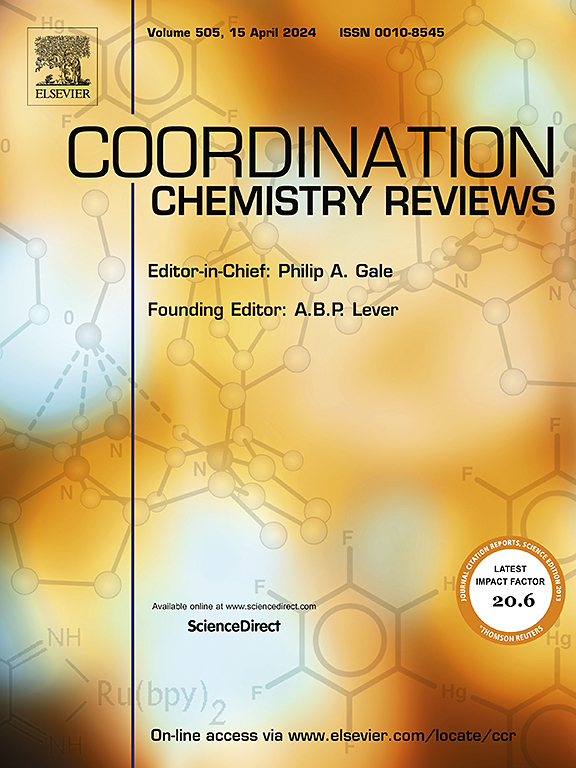Recent advances in the development of metallodrugs for cancer chemoimmunotherapy
IF 20.3
1区 化学
Q1 CHEMISTRY, INORGANIC & NUCLEAR
引用次数: 0
Abstract
Chemoimmunotherapy, with the advantages of chemotherapeutics and immunotherapeutics, has emerged as an effective strategy for cancer treatment, decreasing the drug dosage and improving the curative effect. Chemotherapy-based metal complexes, termed metallodrugs, are extensively used for cancer chemoimmunotherapy. To date, a growing number of research has been devoted to the immunomodulatory process of the body through various mechanisms, among which the induction of immunogenic cell death (ICD) is one of the potential mechanisms of action. Notably, the ICD-inducing metallodrugs can potentially inhibit metastasis and recurrence of tumors, which has attracted the attention of researchers from all walks of life in recent years. It is necessary to summarize specific strategies of immune response activation for metallodrug-mediated chemoimmunotherapy, providing reference significance for future clinical antitumor application. This review discusses the approaches for enhancing immunogenicity by metallodrugs involving organelle-targeting, regulated cell death mechanisms, and site-controlled toxicity. We also summarize recent advances in metallodrugs for combination therapy containing chemoimmunotherapy and hope to provide new insights for developing metallodrugs.开发用于癌症化学免疫疗法的金属药物的最新进展
化疗免疫疗法兼具化疗和免疫疗法的优势,已成为一种有效的癌症治疗策略,可减少药物剂量,提高疗效。以化疗为基础的金属复合物,即金属药物,被广泛用于癌症化疗免疫疗法。迄今为止,越来越多的研究致力于通过各种机制对机体的免疫调节过程进行研究,其中诱导免疫原性细胞死亡(ICD)是潜在的作用机制之一。值得注意的是,诱导 ICD 的金属药物有可能抑制肿瘤的转移和复发,这在近年来引起了各界研究人员的关注。有必要对金属药物介导的化疗免疫疗法激活免疫反应的具体策略进行总结,为今后的临床抗肿瘤应用提供参考意义。本综述讨论了金属药物增强免疫原性的方法,包括细胞器靶向、调控细胞死亡机制和位点控制毒性。我们还总结了金属药物用于含有化学免疫疗法的联合疗法的最新进展,希望能为金属药物的开发提供新的见解。
本文章由计算机程序翻译,如有差异,请以英文原文为准。
求助全文
约1分钟内获得全文
求助全文
来源期刊

Coordination Chemistry Reviews
化学-无机化学与核化学
CiteScore
34.30
自引率
5.30%
发文量
457
审稿时长
54 days
期刊介绍:
Coordination Chemistry Reviews offers rapid publication of review articles on current and significant topics in coordination chemistry, encompassing organometallic, supramolecular, theoretical, and bioinorganic chemistry. It also covers catalysis, materials chemistry, and metal-organic frameworks from a coordination chemistry perspective. Reviews summarize recent developments or discuss specific techniques, welcoming contributions from both established and emerging researchers.
The journal releases special issues on timely subjects, including those featuring contributions from specific regions or conferences. Occasional full-length book articles are also featured. Additionally, special volumes cover annual reviews of main group chemistry, transition metal group chemistry, and organometallic chemistry. These comprehensive reviews are vital resources for those engaged in coordination chemistry, further establishing Coordination Chemistry Reviews as a hub for insightful surveys in inorganic and physical inorganic chemistry.
 求助内容:
求助内容: 应助结果提醒方式:
应助结果提醒方式:


